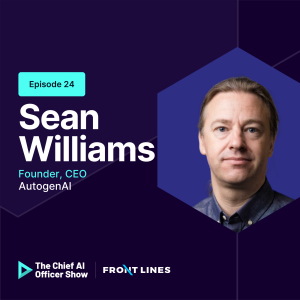
Wednesday Jun 04, 2025
AutogenAI’s Sean Williams on How Philosophy Shaped a AI Proposal Writing Success
A philosophy student turned proposal writer turned AI entrepreneur, Sean Williams, Founder & CEO of AutogenAI, represents a rare breed in today's AI landscape: someone who combines deep theoretical understanding with pinpointed commercial focus. His approach to building AI solutions draws from Wittgenstein's 80-year-old insights about language games, proving that philosophical rigor can be the ultimate competitive advantage in AI commercialization.
Sean's journey to founding a company that helps customers win millions in government contracts illustrates a crucial principle: the most successful AI applications solve specific, measurable problems rather than chasing the mirage of artificial general intelligence. By focusing exclusively on proposal writing — a domain with objective, binary outcomes — AutogenAI has created a scientific framework for evaluating AI effectiveness that most companies lack.
Topics discussed:
- Why Wittgenstein's "language games" theory explains LLM limitations and the fallacy of general language engines across different contexts and domains.
- The scientific approach to AI evaluation using binary success metrics, measuring 60 criteria per linguistic transformation against actual contract wins.
- How philosophical definitions of truth led to early adoption of retrieval augmented generation and human-in-the-loop systems before they became mainstream.
- The "Boris Johnson problem" of AI hallucination and building practical truth frameworks through source attribution rather than correspondence theory.
- Advanced linguistic engineering techniques that go beyond basic prompting to incorporate tacit knowledge and contextual reasoning automatically.
- Enterprise AI security requirements including FedRAMP compliance for defense customers and the strategic importance of on-premises deployment options.
- Go-to-market strategies that balance technical product development with user delight, stakeholder management, and objective value demonstration.
- Why the current AI landscape mirrors the Internet boom in 1996, with foundational companies being built in the "primordial soup" of emerging technology.
- The difference between AI as search engine replacement versus creative sparring partner, and why factual question-answering represents suboptimal LLM usage.
- How domain expertise combined with philosophical rigor creates sustainable competitive advantages against both generic AI solutions and traditional software incumbents.
Listen to more episodes:
Intro Quote:
“We came up with a definition of truth, which was something is true if you can show where the source came from. So we came to retrieval augmented generation, we came to sourcing. If you looked at what people like Perplexity are doing, like putting sources in, we come to that and we come to it from a definition of truth. Something's true if you can show where the source comes from. And two is whether a human chooses to believe that source. So that took us then into deep notions of human in the loop.” 26:06-26:36
No comments yet. Be the first to say something!